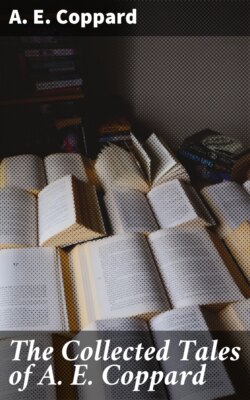Читать книгу The Collected Tales of A. E. Coppard - A. E. Coppard - Страница 8
На сайте Литреса книга снята с продажи.
V
ОглавлениеTable of Contents
The marriage was a gay little occasion, but they did not go away for a honeymoon. Sophy’s grandmother from a distant village, Cassandra Fundy, who had a deafness and a speckled skin, brought her third husband, Amos, whom the family had never seen before. Not a very wise man, indeed he was a common man, stooping like a decayed tree, he was so old. But he shaved every day and his hairless skull was yellow. Cassandra, who was yellow too, had long since turned into a fool; she did not shave, though she ought to have done. She was like to die soon, but everybody said old Amos would live to be a hundred; it was expected of him, and he, too, was determined.
The guests declared that a storm was threatening, but Amos Fundy denied it and scorned it.
“Thunder p’raps, but ’twill clear; ’tis only de pride o’ der morning.”
“Don’t you be a fool,” remarked his wife, enigmatically, “you’ll die soon enough.”
“You must behold der moon,” continued the octogenarian; “de closer it is to der wheel, de closer der rain; de furder away it is, de furder der rain.”
“You could pour that man’s brains into a thimble,” declared Cassandra of her spouse, “and they wouldn’t fill it—he’s deaf.”
Fundy was right; the day did clear. The marriage was made and the guests returned with the man and his bride to their home. But Fundy was also wrong, for storm came soon after and rain set in. The guests stayed on for tea, and then, as it was no better, they feasted and stayed till night. And Harvey began to think they never would go, but of course they couldn’t and so there they were. Sophy was looking wonderful in white stockings and shiny shoes and a red frock with a tiny white apron. A big girl she seemed, with her shaken dark hair and flushed face. Grandmother Fundy spoke seriously, but not secretly to her.
“I’ve had my fourteen touch of children,” said Grandmother Fundy. “Yes, they were flung on the mercy of God—poor little devils. I’ve followed most of ’em to the churchyard. You go slow, Sophia.”
“Yes, granny.”
“Why,” continued Cassandra, embracing the whole company, as it were, with her disclosure, “my mother had me by some gentleman!”
The announcement aroused no response except sympathetic, and perhaps encouraging, nods from the women.
“She had me by some gentleman—she ought to ha’ had a twal’ month, she did!”
“Wasn’t she ever married?” Sophy inquired of her grandmother.
“Married? Yes, course she was,” replied the old dame, “of course. But marriage ain’t everything. Twice she was, but not to he, she wasn’t.”
“Not to the gentleman?”
“No! Oh no! He’d got money—bushels! Marriage ain’t much, not with these gentry.”
“Ho, ho, that’s a tidy come-up!” laughed Harvey.
“Who was the gentleman?” Sophia’s interest was deeply engaged. But Cassandra Fundy was silent, pondering like a china image. Her gaze was towards the mantelpiece, where there were four lamps—but only one usable—and two clocks—but only one going—and a coloured greeting card a foot long with large letters KEEP SMILING adorned with lithographic honeysuckle.
“She’s hard of hearing,” interpolated Grandfather Amos, “very hard, gets worse. She’ve a horn at home, big as that ...” His eyes roved the room for an object of comparison, and he seized upon the fire shovel that lay in the fender. “Big as that shovel. Crown silver it is, and solid, a beautiful horn, but”—he brandished the shovel before them—“her won’t use ’en.”
“Granny, who was that gentleman?” shouted Sophy. “Did you know him?”
“No! No!” declared the indignant dame. “I dunno ever his name, nor I don’t want to. He took hisself off to Ameriky, and now he’s in the land of heaven. I never seen him. If I had, I’d ’a’ given it to him properly; oh, my dear, not blay-guarding him, you know, but just plain language! Where’s your seven commandments?”
At last the rain abated. Peeping into the dark garden you could see the fugitive moonlight hung in a million raindrops in the black twigs of all sorts of bushes and trees, while along the cantle of the porch a line of raindrops hung, even and regular, as if they were nailheads made of glass. So all the guests departed, in one long staggering, struggling, giggling, guffawing body, into the village street. The bride and her man stood in the porch, watching, and waving hands. Sophy was momentarily grieving: what a lot of trouble and fuss when you announced that henceforward you were going to sleep with a man because you loved him true! She had said good-bye to her Grandmother Cassandra, to her father and her little sister. She had hung on her mother’s breast, sighing an almost intolerable farewell to innocence—never treasured until it is gone—and thenceforward a pretty sorrow cherished more deeply than wilder joys.
Into Harvey’s mind, as they stood there at last alone, momentarily stole an image of a bright-haired girl, lovely, silent, sad, whom he felt he had deeply wronged. And he was sorry. He had escaped the snare, but if there had been no snare he might this night have been sleeping with a different bride. And it would have been just as well. Sophy looked but a girl with her blown hair and wet face. She was wiping her tears on the tiny apron. But she had the breasts of a woman and decoying eyes.
“Sophy, Sophy!” breathed Harvey, wooing her in the darkness.
“It blows and it rains, and it rains and it blows,” chattered the crumpled bride, “and I’m all so bescambled I can’t tell wet from windy.”
“Come, my love,” whispered the bridegroom, “come in, to home.”
